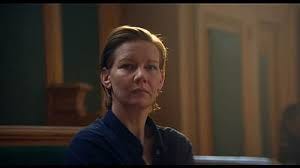ANATOMY OF A FALL is a French courtroom thriller from writer/director/editor Justine Triet and it won the Palme D’or at the Cannes Film Festival this past spring. Though it wasn’t selected for France’s submission to the International Feature Film award at the Oscars, it’s become a significant title during this year’s awards season and so it shot up to my watchlist. Starring Sandra Hüller, the film lived up to its reputation as not only a fascinating legal thriller but a sharp, incisive look at a troubled marriage. Co-written by Triet and Arthur Harari, the movie is complicated and thorny but extremely entertaining and gripping.
A novelist Sandra (Hüller) is being interviewed by a young journalist but her husband Samuel (Samuel Theis) is upstairs blasting music so loud that the interview can’t take place. Her partially blind son Daniel (Milo Machado-Graner) goes out for a walk, but when he returns, Samuel is dead in the snow after an apparent fall. Sandra becomes under suspicion of murder when an autopsy is inconclusive about whether it was a suicide due to an injury to his head that was inflicted prior to death. Sandra then stands trial, and her marriage is examined from every possible angle just like the details of Samuel’s fall.
I’ll say this outright. Triet does not explicitly reveal whether or not Samuel fell by accident, jumped himself, or was pushed by Sandra. That might be a spoiler, but for me it is the central thrust of the film. Triet seems far more interested in how Sandra’s entire life, her novels, her relationships are on trial. Everything, from an innocuous glass of wine on a weekend afternoon to the harsh details of a nasty argument, is not only discussed but shown as proof that Sandra killed her husband.
It had me thinking about the nightmare scenario where every single thing I’ve done is put on trial and having to defend my actions. There isn’t really a defense, except weakly protesting “it wasn’t like that” or “sometimes you say things.” What if everything I did was not only taken out of context but shown within a new context as evidence to support a hypothesis, an interpretation. The prosecutor (Antoine Reinartz) truly brings everything to the surface and putting Sandra’s own mistakes and cruelty on display.
Much to Triet and Harari’s credit, Sandra is guilty of her own part in the dissolution of her marriage and is not shown to be a perfect wife or widow. And Samuel also plays a part in this marriage, but because he is dead he doesn’t have to answer for his mistakes. But isn’t that what being human is like? We all play a part in our relationships, and are capable of anything. It might not go to such extremes as in ANATOMY OF A FALL, but it could be seen that way when put under a microscope. Is it possible that out actions reveal us to be monsters when held under scrutiny and one right after the other? Some of the things that are discussed in Sandra’s trial happened years ago. Some had been forgiven only to be brought up again as a cruel weapon. But when the whole past is dissected in the present, the results are ugly and unfair.
A really powerful exchange is when Samuel’s therapist is on the witness stand, testifying about his sessions with Samuel about Sandra. How controlling she was, how demanding and dismissive she was. But Sandra replies that if her therapist were on the stand then she could offer testimony about Samuel’s own faults and martyrdom. That is such an interesting concept; you could rewrite this movie where Sandra dies and Samuel is put on trial. How would their marriage look under those circumstances?
Another intense sequence is when the prosecutor plays a recording of a vicious argument between Samuel and Sandra the day before the fall that was recorded without Sandra knowing. I had my own interpretation of the fight, and then the prosecutor had a completely different one. It feels wrong to bear witness to this awful moment in the marriage, and the film cuts to the entire courtroom listening as if for entertainment. But it hit me that I was doing the same thing, and even the act of interpreting someone else’s arguments felt wrong to me. Granted I was watching a fictional movie so whatever. But still: I was participating in this marriage autopsy and making conclusions that were affected by my own biases and experiences.
I’m curious to watch ANATOMY OF A FALL again, to see how my opinion of the events in the film changes. With other marriage movies like MARRIAGE STORY, KRAMER VS. KRAMER, BEFORE MIDNIGHT, and PHANTOM THREAD, each rewatch brings more into perspective and how the film views each character transforms. ANATOMY OF A FALL seems like the kind of movie that will shift on each watch as small details become more prominent. It’s quite a fascinating movie, and one that doesn’t offer any easy answers.





